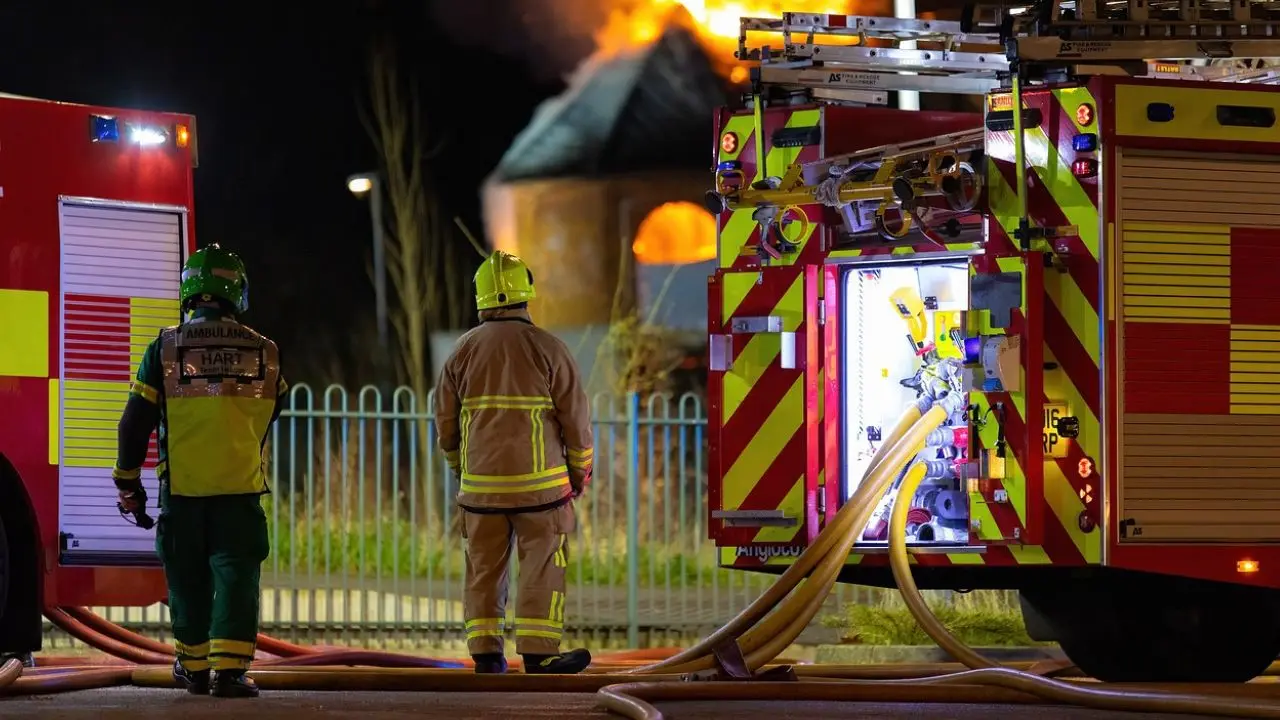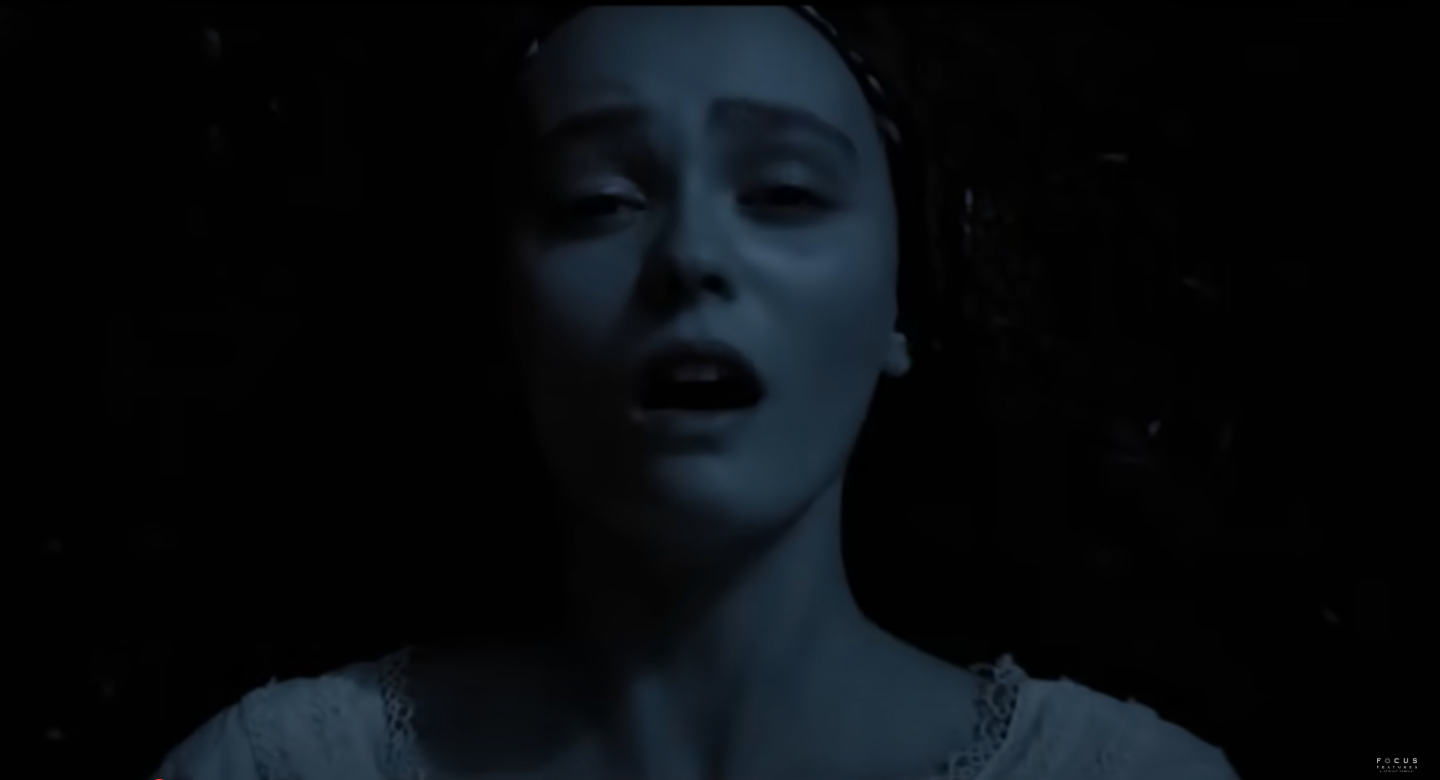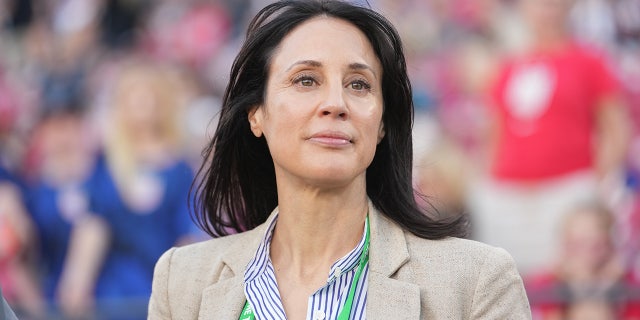Could desire be a form of demonic possession? A superstitious question, I know, but one I’ve seriously considered. Because when I recall the last time I experienced desire for another, nothing seemed impossible. All the positions, the acts that had previously felt out of bounds, that I’d recoiled from, not only stoked my curiosity but also appeared to fall entirely within the realm of possibility. Perfect sense, I concluded. Common sense. My desires, of which I wanted to be a full and willing participant, made up a long list: Anal. Choking. Fisting. Slapping. Edging. Rimming. Being watched, as I touch myself. Being bound. Fellatio in a public place. Period sex, when flow is heaviest. Teabagging in cold morning air, my nose running, birdsong cheering me on. Cunnilingus and fingering from under the table, while dinner turns cold and I get warm.
Maybe that’s why Ellen Hutter’s initial prayer at the beginning of Robert Eggers’ 2024 remake of Nosferatu felt so familiar to me. The sounds she utters afterwards, as she lies dressed in a thin nightgown on bare ground, are even more recognizable. I have uttered an approximation of that prayer, and those moans, varying only in pitch and intensity, have escaped my body.
This is a horror movie, but to my surprise, I left the theater feeling aroused. There must be something wrong with me, I thought. After all, isn’t Nosferatu about toxic relationships? Didn’t I just finish watching scene upon scene of gratuitous bloodshed, of murder, of human suffering, of evil triumphing over good? Yet it also struck me as empowering, and one of the most feminist films I’d seen in a while. In Eggers’ hands, the story becomes something more: it’s a monster movie, yes, but it’s also a film about what a woman is willing to sacrifice to sate her appetite—not the vampire’s appetite, but her own.
Ellen’s character is typically remembered more for her final sacrifice than her desire. And no wonder. After the vampire wreaks havoc on the town of Wisborg, Ellen and Professor von Franz come to agree, in secret, that the only way for Count Orlok to be vanquished is through Ellen herself. She must offer her body—and willingly—to satisfy and destroy an otherwise invincible demon. It’s a familiar motif, and also a rather antiquated and yawn-worthy one: the notion of offering up a sacrifice, especially a woman, to save the world, because it’s assumed a woman will always act for the greater good; because a woman will put the needs of others before her own; because by virtue of being a woman, she must atone for the notion of original sin, and feel pity for the suffering of strangers she has no especial reason to care for. Boring, to say nothing of unrealistic.
This is the story of a woman who will stop at nothing to satisfy her desire.
It’s all a bit too comfortable, too convenient, and it’s a testament to Eggers’ filmmaking power that the notion of female self-sacrifice as a heroic gesture comes across as utterly anticlimactic. It’s like a page ripped out of a fable, a fairy tale. In Eggers’ Nosferatu, the sacrifice isn’t the point. This is the story of a woman who will stop at nothing to satisfy her desire. While it’s no surprise that Lily-Rose Depp’s Ellen Hutter exhibits and wields significantly more agency than her 1922 counterpart, what does feel refreshing is that it’s not simply the agency requisite to stepping into the role of a voluntary sacrifice. It’s agency to seek out and plumb the depths of desire, and, most vital, to sacrifice anything and anyone that stands in the way of that desire—be it a marriage, friends, or an entire town.
Like any epic adventure story that has its twists and turns, that has its pitfalls and victims, Nosferatu is about the journey to great, mind-blowing sex, the kind of sex that isn’t typically requisite to marriage and—surely, one of life’s ugly truths—is more probably found outside of it (see also: Halina Reijn’s recent movie Babygirl). This is a film about feeding female desire, and being bold and brazen enough to want satisfaction so badly that everything and everyone must, by necessity, fall to the wayside. Ellen’s desire is so strong that it causes shipwreck, brings plague, kills her beloved friend, Anna, and drives people to madness, even prompting the hard-ass, stick-in-the-mud Friedrich to commit abominations, such as necrophilia on his wife’s corpse. It also weakens and nearly destroys Ellen’s husband, Thomas.
While I’ve no doubt that Ellen loves Thomas and Thomas loves Ellen (cue the violins), in Nosferatu, love does not conquer all. Love is tested, weighed against female desire, and comes out on the losing side. When Thomas fearfully warns Ellen that he knows Orlok is coming for her, she taunts her husband, emasculating him. Though she kneels at his feet, the power and the authority in this scene lie wholly with her. She tells Thomas that he couldn’t satisfy her like the other he could, and I believe her. She’s not haunted. She was never haunted. Well before Ellen Hutter prayed to her “guardian angel,” the monster already existed within her. Herr Knock describes her, early in the film, as sylph-like in her beauty, and it becomes something of a running theme to conclude that Ellen is someone exceptional, a woman not of this world, “not of humankind.” I would disagree, with vehemence. There are varying degrees of Ellen Hutter in all of us. Rather, it is Anna, doll-like, pious, complacent and submissive, who strikes me as being not so much “of humankind” but manufactured from mankind.
Well before Ellen Hutter prayed to her ‘guardian angel,’ the monster already existed within her.
At one point, Count Orlok says, perhaps a bit too modestly, “I am an appetite, nothing more.” But he isn’t just an appetite; he is Ellen’s appetite. And by extension, he is the manifestation of the appetite of any red-blooded woman, whether living in the nineteenth-century or now. This appetite is wonderfully, triumphantly dominant in its monstrosity, in its need and hunger, and in its inexhaustible ruthlessness. It is something to be reveled in, and it isn’t to be ignored, much less dreaded. Female desire is a force that has cowed many a man, made him shrink and shrivel, and brought him face-to-face with his most personal failings, his ineptitude. I have only to think of Thomas Hutter’s attempt at robust sex after Ellen provokes him to the point of anger. Oh, dear Thomas. All that futile, earnest thrusting. It is always an event, like watching a dog chase its own tail, to see an otherwise mild-mannered man erupt, but that scene only more deeply impressed in my mind that, in matters of desire, the logic may hold that something is perhaps better than nothing. Yet it will never replace what truly makes your blood run and your body burn.
I don’t believe it’s Ellen’s supposed “covenant” with Orlok via a prayer that incites the vampire’s wrath when she marries Thomas. That’s the fairy tale and fable element at work again. No, I thought to myself, that’s only a front. And the story, if viewed through an altered lens, becomes an unexpectedly modern one. Thomas may be kind and caring and tender. He is every bit the conventional Prince Charming, a true hero. But he doesn’t fully satisfy his wife, so—what is a girl to do?—she must summon desire from another source. What fairy tales, even the dark ones, don’t go into is that the story doesn’t end with a kiss and a ring and the promise of forever. That’s merely the beginning. The bed is its own threshold, the equivalent of Orlok’s fortress, and the shadow it casts is long. Just as the proverbial dragon needs to be slayed and misunderstandings between lovers unknotted for a couple to unite, female desire also has to be fed—over and over. For me, that is what Nosferatu is really about: what a woman is willing to sacrifice to finally have the chance to achieve a stunning, glorious, life-draining “big O.”
And what Ellen is willing to sacrifice is significant. One of the most memorable losses depicted in the film is the killing of Anna’s daughters. I’m going to veer into the taboo, the verboten, the unthinkable, and say I am convinced it’s both important and necessary that Eggers shows the difficult scene of Orlok holding one of Anna’s children like a ragdoll and draining her blood before casting her corpse away. I’m grateful for that scene because, when I watched it, I felt something unfurl in my chest: that burden of having to care, or of feeling that, because I identify as a woman, I should, by instinct, show concern about things like the welfare of children and other small creatures, that I should feel pity when I see roadkill on the highway or be moved when tragedy befalls the innocent. Ellen knew Orlok’s uncompromising nature; she always knew. I would offer that a portion of the real agency in the film is that she knew, and she let it all happen anyway. These horrors could have been stopped much sooner, but they weren’t.
To this day, motherhood is considered one of the most sacred and foundational pillars of being a woman, propped up and defended as an ideal. But the death of Anna’s children sacrifices that sanctity for female sexual fulfillment. The power of motherhood is thrown, repulsively, almost casually, like a piece of unwanted flesh from the deli counter, right in our faces. Contrast this with the final scene, which depicts Ellen’s deathbed. The sheets are saturated with blood, and instantly, I thought: childbirth. But this isn’t childbirth. This is consummation at its finest. And how quiet and serene the conclusion—even sublime. How masterful and resplendent. How fantastically empowering. Children gone. Annoying, sanctimonious couple dead. Husband sent on a fool’s errand and cuckolded. I’ll speak only for myself when I say I will take the orgasm over the baby any day.
It has always nagged me when I hear of desire being described as dark, as if there were such a thing as the Splenda version of desire or Desire Lite. Of course desire is dark. Of course desire is hard to face, because to confront desire inevitably means pressing one’s nose against the glass and boring one’s eyes as far into the reaches of human nature as one can endure. The whole point of desire is that it is meant to push one’s limits, to test and probe one’s boundaries, not just sexually but in other ways: mentally, emotionally. There was nothing delicate or beautiful about what I felt for the man who awakened my desire, which was so powerful that my body couldn’t contain it. One night on my own, my blood humming beneath my skin, I took a paper-cutting knife, pushed up the blade, and drew a short, straight line down my thigh. When the skin wouldn’t break, I sliced again, then again, until the wound turned liquid and shone in the dark. I touched the blood, tasted it, and my knees shook. It doesn’t seem a coincidence that I came hardest thinking of the man, who treated me the worst, and he didn’t even need to be there when his name, monosyllabic, interchangeable in those fleeting, precious moments with other words, with God, with Fuck, flew out of my throat like a scream. By that point, I had lost count of the number of times I had apologized to him during our meetings. I’m sorry. I’m sorry. I’m sorry. Both in-person and in writing. Variations of: I’m sorry. I’ve done wrong. I’ve made another mistake. I know I’ve disappointed you. I will do better. You’re always right. I remember hanging my head, lowering my voice, and putting my guilty face on. “I apologize,” I said, deliberately adding a small tremor, so he would believe me. I arranged my expression, as the spit gathered in a small swell on my tongue and my knuckles turned white on the wooden chair to hold myself back.
Desire is as complex as it can be dangerous.
My point here is not to support toxic relationships that are often and frequently abusive. It’s that desire is as complex as it can be dangerous. To this end, if I were to take a lesson from Nosferatu, I would argue that self-sacrifice does not mean so much giving up as giving in, of learning more about yourself and of understanding every facet of your body and its needs, especially as a woman. I know too well the little smile Ellen gives Orlok in the moments the sun rises, and he is about to disintegrate. My own body trembling with the aftershock of a climax, warm sweat fast cooling, and the tide of exhaustion lulling me to a dreamless sleep, that is a smile of victory, of saying but not saying, “I’ve won this round. 15 – love.”
No wonder I found the final scene of Nosferatu so invigorating, because I’d like to think that in real life, the equivalent of Ellen Hutter would get out of bed again, dress herself, and go about her business, perhaps make a cup of joe before proceeding to her hot yoga session. Let him do the laundry. Let him replace the sheets—or not, because in less than twelve hours, she’ll return, and they will only get dirty again.
“You’re losing yourself to him,” a friend said to me, seeing that I was changing because I was in the throes of desire for another. “You don’t realize it, but you’re losing yourself. Do you love him more, or do you love yourself more?” I paused and considered. It was true that for some time I had felt drained and tired. With every apology, every supposed misstep, it was as if a sketch of my identity were being slowly erased. Then I said, “I’m not losing myself. I’m finding myself.” Already I understood that the contours of something new was taking shape. I was re-drawing the borders; I was stitching out a fresh sovereignty and sky and marking out what could and could not enter that truly sacred space: the self. I was shuddering through the membrane of my old skin and molting what was no longer useful, while keeping close the priceless life lessons I’d earned. Before ending the call, I added with a brusqueness that startled me, “Oh, and I will always love myself more. Always.”
Terrifying, isn’t it? And so fitting for the horror genre: a woman placing her desire above all else. Above morality. Above wifehood and motherhood. Above even the individual she loves. Months have passed, and my version of Count Orlok is, like the monster cracking apart in the sun, long gone. But the knee-shaking, body-contorting orgasms happily remain. When I scan my bookshelves, I take in what my Orlok has left me. All those valuable tomes, and how I have sunk my teeth into their pages to suck, well, like a vampire, their pulp and their substance. I look at my reflection in the mirror, and I see a different, stronger version of my body. More lean muscle. Cheeks flushed from intense exercise. Forehead and nose dripping sweat. Pleasure, knowledge, health and vitality—all in all, not too bad a result.
Which begs this question: I wonder who, in the end, is the real monster in Nosferatu, and what the term “monster” even means within the context of this film. What you see, after all, isn’t always the truth. Who has really been feeding off of whom the whole time? Think, then think again.






















































